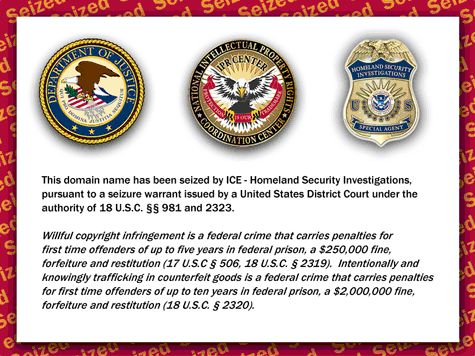Last Thursday we reported on the seizure of the music linking site RapGodFathers. As it turned out this was the first target in a growing list of domains that were seized in the days that followed, including the BitTorrent meta-search engine Torrent-Finder.
All this time the authorities remained silent on the purpose and scope of the actions, until today. Apparently the DOJ and ICE had picked the label “Cyber Monday Crackdown” for their actions, and this meant that they couldn’t release their statement earlier.
However, today a press release was finally issued, detailing which sites were targeted and why.
“As of today – what is known as ‘Cyber Monday’ and billed as the busiest online shopping day of the year – anyone attempting to access one of these websites using its domain name will no longer be able to make a purchase. Instead, these online shoppers will find a banner notifying them that the website’s domain name has been seized by federal authorities,” it was announced.
“The coordinated federal law enforcement operation targeted online retailers of a diverse array of counterfeit goods, including sports equipment, shoes, handbags, athletic apparel and sunglasses as well as illegal copies of copyrighted DVD boxed sets, music and software.”
The message below is posted on the seized sites
“By seizing these domain names, we have disrupted the sale of thousands of counterfeit items, while also cutting off funds to those willing to exploit the ingenuity of others for their own personal gain,” said Attorney General Holder in a subsequent press release.
Since 95% of the domains were related to counterfeit goods, this explanation was kind of expected, but one question remains unanswered. In fact, this is the question that prompted so many news outlets to pick up the story over the last few days.
Those who took a careful look at the list of seized domains will have noticed that there are some odd entries. Among the replica watches and fake sport shirts are three sites that were directly or indirectly linking to music. That’s not counterfeiting, although releasing music before it hits the stores is a criminal act so these targets can be explained.
But there’s an even stranger entry, and that is Torrent-Finder.
Torrent-Finder is not a typical torrent site where one can download torrent files. It’s merely a meta-search engine that redirects users to other sites. The site simply displays a search box and has no browsable archive. The site is not encouraging or even facilitating copyright infringement any more than other search engines such as Google.
So the question that we’d like to see answered is what the grounds were to seize Torrent-Finder? Could it have been a mistake? Or perhaps a test?
If the US authorities were to target BitTorrent sites then Torrent-Finder is arguably the least likely target. Still, the owner lost its domain without even receiving a notice. That doesn’t seen right somehow.
If it’s so easy for the US Government to obtain a seizure order for a website that is simply a meta-search engine, and not by any means involved in linking to or hosting copyrighted material, then where does it stop?
Meanwhile, TorrentFreak has been made aware of (many) additional domains that are on a Government seizure list. More info on this is expected to trickle in later in the week and might reveal more about the future direction of Operation In Our Sites 2 after “Cyber Monday Crackdown.”





